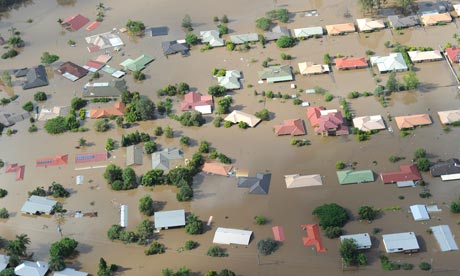Climate change and ....
Two studies suggest for the first time a clear link between global warming and extreme precipitation

There's a sound rule for reporting weather events that may be related to climate change. You can't say that a particular heatwave or a particular downpour – or even a particular freeze – was definitely caused by human emissions of greenhouse gases. But you can say whether these events are consistent with predictions, or that their likelihood rises or falls in a warming world.
Weather is a complex system. Long-running trends, natural fluctuations and random patterns are fed into the global weather machine, and it spews out a series of events. All these events will be influenced to some degree by global temperatures, but it's impossible to say with certainty that any of them would not have happened in the absence of man-made global warming.
But over time, as the data build up, we begin to see trends which suggest that rising temperatures are making a particular kind of weather more likely to occur. One such trend has now become clearer. Two new papers, published by Nature, should make us sit up, as they suggest for the first time a clear link between global warming and extreme precipitation (precipitation means water falling out of the sky in any form: rain, hail or snow).
One paper, by Seung-Ki Min and others, shows that rising concentrations of greenhouse gases in the atmosphere have caused an intensification of heavy rainfall events over some two-thirds of the weather stations on land in the northern hemisphere. The climate models appear to have underestimated the contribution of global warming on extreme rainfall: it's worse than we thought it would be.
The other paper, by Pardeep Pall and others, shows that man-made global warming is very likely to have increased the probability of severe flooding in England and Wales, and could well have been behind the extreme events in 2000. The researchers ran thousands of simulations of the weather in autumn 2000 (using idle time on computers made available by a network of volunteers) with and without the temperature rises caused by man-made global warming. They found that, in nine out of 10 cases, man-made greenhouse gases increased the risks of flooding. This is probably as solid a signal as simulations can produce, and it gives us a clear warning that more global heating is likely to cause more floods here.
None of this should be surprising. As Richard Allan points out, also in Nature, the warmer the atmosphere is, the more water vapour it can carry. There's even a formula which quantifies this: 6-7% more moisture in the air for every degree of warming near the Earth's surface. But both models and observations also show changes in the distribution of rainfall, with moisture concentrating in some parts of the world and fleeing from others: climate change is likely to produce both more floods and more droughts.
We still can't say that any given weather event is definitely caused by man-made global warming. But we can say, with an even higher degree of confidence than before, that climate change makes extreme events more likely to happen.




/https%3A%2F%2Fassets.over-blog.com%2Ft%2Fcedistic%2Fcamera.png)
/https%3A%2F%2Fstorage.canalblog.com%2F93%2F67%2F300583%2F79583573_o.jpg)
/http%3A%2F%2Fstatic.guim.co.uk%2Fsys-images%2FGuardian%2FAbout%2FGeneral%2F2012%2F9%2F21%2F1348231350306%2FBig-picture-Spill-008.jpg)
/http%3A%2F%2Fstatic.guim.co.uk%2Fsys-images%2FGuardian%2FPix%2Fpictures%2F2012%2F2%2F27%2F1330343060996%2FDan-Lepard-byline-pic-003.jpg)